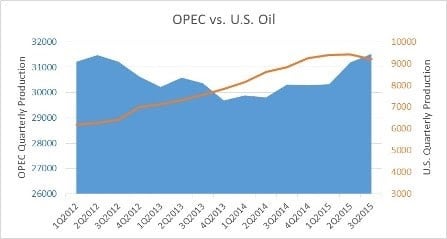Low Oil Prices and OPEC, Not So Happy Together
We are a little more than a month away from OPEC’s next meeting in Vienna on December 4, 2015.
OPEC altered the course of the oil markets last year when it decided to cast aside its traditional role of maintaining balance through production cuts. Instead, it pursued a strategy of fighting for market share, contributing to an immediate rout in oil prices. WTI and Brent then went on to dive below $50 in the weeks following OPEC’s decision.






